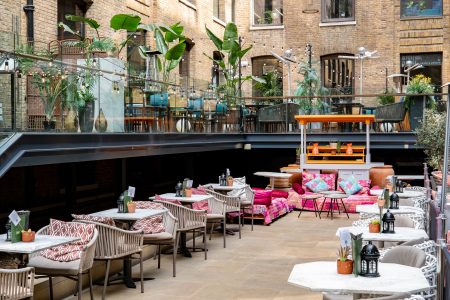Boparan Restaurant Group Modern Slavery Statement 2024
Boparan Restaurant Group Modern Slavery Statement 2024
The document has been published in accordance with the Modern Slavery Act 2015 (MSA) and constitutes the slavery and human trafficking statement for Boparan Restaurants Holdings Limited (of which Carluccio’s (UK) Limited, Cinnamon Collection Limited, Fishworks Restaurants Limited, Giraffe Concepts Limited, Gourmet Burger Kitchen (UK) Limited, SC Restaurants (UK) Limited are subsidiaries) and its relevant subsidiaries for the financial year ended 31 December 2023. (BRG).
References in the statement to “forced labour” mean any conduct which an offence under Part I of that Act is including slavery, servitude, any type of forced or compulsory labour and trafficking for the purposes of exploitation.
Overview
As an employer and provider if the goods and services for the customer, we have a role to play in the fight against slavery, servitude, forced labour and human trafficking (Modern Slavery). Boparan Restaurant Group (BRG) has a desired zero tolerance approach to Modern Slavery of any kind in our operations and supply chain. It is our responsibility to prevent and identify any exploitation and to influence and work together with suppliers and business partners to raise labour standards in our industry. Despite being a UK centric company many component parts of the food, we serve are sourced outside the UK and it is our responsibility to promote high standards of ethical behaviour across our supply chain in the food we buy and the services we procure.
We do not tolerate forced labour either within our business itself or within our supply chain. We expect our supply chain (whether direct suppliers or those that directly or indirectly supply our direct suppliers) to share the same values.
Our Business
BRG is a significant player in the UK casual dining market, employing over 2,800 people. Our brands include Giraffe, Ed’s Easy Diner, GBK (Gourmet Burger Kitchen), Carluccio’s, Fishworks, Cinnamon Collection Restaurants and Slim Chickens. As a responsible business, we recognise our responsibility to ensure that our business activities are guided by the careful balance of the interests of all our stakeholders. For this reason, the company has established environmental and social policies and procedures as well as programs that protect and sustain the environment, workers within our supply chain and restaurants, and our consumers.
We have reviewed our business and our supply chain. Neither we nor, to the best of our knowledge, our supply chain makes use of forced labour.
Supply Chain Purchasing Model
Our product supply chains are extensive and global; we source over 3000 products from more than 250 suppliers whose supply chains span over 30 countries. We operate a centralised procurement model in which we have established strong relationships with food, service, and non-food suppliers. We require all our direct suppliers to work closely with their suppliers, distributers, agents, and producers to promote total transparency and knowledge of the operations within our supply chain.
We have reviewed MSA statements published by our suppliers on use of forced labour to ensure that they in turn are taking what appears to us to be appropriate steps.
New Suppliers
We have a rigorous process for assessing new suppliers on their technical capabilities and ethical credentials. We do not engage with business partners, including suppliers, who do not meet our high standards. Key members of our procurement team have been trained to identify the risk of indicators of modern slavery and human trafficking in our supply chains and in the procurements process we may seek to impose contractual obligations on our suppliers under which they:
• warrant that their business and, to the best of their knowledge, their own supply chain do not use forced labour.
• agree to provide us on request with responses to a self-assessment questionnaire regarding use of forced labour and steps they have taken to ensure it is not used by them or their supply chain.
• agree to permit us and third parties acting for us to inspect their facilities, records, and practices, to have access to their personnel and to audit their business for the purposes of ensuring that they comply with these obligations and that there is no use of forced labour.
• impose equivalent obligations on their own suppliers.
Supplier Ethical Data Exchange (SEDEX) and Ethical Audits
All new suppliers to the business are required to register with and complete assessments within SEDEX. Following a review of the outcomes of these assessments ethical audits may be carried out. It is our policy that any suppliers who are deemed high risk, as identified by the SEDEX risk assessment score, undertake an audit within three months of being identified high risk. A preliminary desktop review of the suppliers has identified no high-risk suppliers to our business.
Our People
All our employees are paid by bank transfer, and we do not allow payment to be made into third party bank accounts thus minimising the risk of forced compulsory labour. We do employ family members, however, where possible we avoid this being in a direct reporting relationship and where it is their line managers HR are aware and monitor the situation.
Governance
The relevant head of each business area such as Brand Operations Directors and heads of the procurement, legal, property, finance and IT teams have responsibility for their department’s compliance with our Responsible Sourcing Policy. All policies are approved by the CEO annually.
Assessment of Effectiveness in Preventing Modern Slavery
We will continue to keep under review new risks as they emerge and carefully monitor new suppliers and business activities. We believe in continuous improvement in the prevention of Modern Slavery, and we will continue to review our ethical trading programme annually to ensure it reflects best practise.
This statement was approved by the Board of Boparan Restaurant Group.
Signed
Satnam Leihal
CEO
